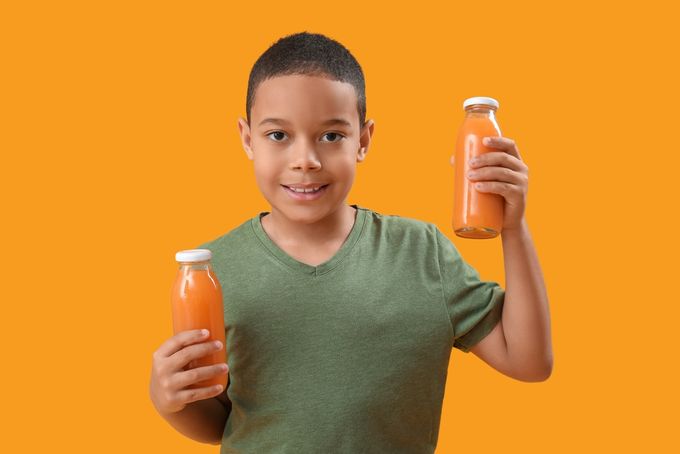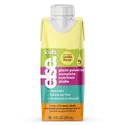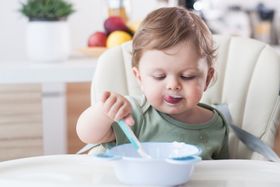5 Types of Nutritional Drinks for Kids: Make Healthy Choices
From fortified milk and juice to smoothies, explore our list of the best nutritionala guide to the healthiest kid-friendly beverages packed with nutrients.
Published June 18, 2024

Many parents struggle to get their kids to eat a balanced, nutrient-rich diet. Chicken nuggets, french fries, and sugary drinks are often the preferred choices over vegetables and other healthy foods. This can lead to vitamin deficiencies, obesity, and other health issues in children.
» Plan a healthier lunch for your two year old with 35 delicious meal ideas
The food and beverage industry has made this problem more challenging to solve. Many nutritional drinks for toddlers are laden with sugar, artificial flavors, and colors and lack real nutritional value.
Major brands spend millions on advertising these unhealthy products directly to children through TV commercials during cartoon shows and games on kid-focused websites.
But what if there are healthy alternatives?
» Try the best nutritional drinks for your kid as a healthy alternative to sodas
1. Milk-Based Kids' Vitamin Drinks
For a long time, milk was the gold standard in children’s nutritional drinks. It's still an excellent choice. Just two to three cups daily can deliver 149 calories, 7.7 grams of protein, 8 grams of fat, and 300 milligrams of calcium.
Some parents even choose options fortified with vitamin D so their kids can double up on the nutrients. But, you should be careful, as excess amounts can limit iron uptake. Consult your pediatrician if you think low-fat milk might be a better choice for your little one.
» Find out which is better: Plant-based or dairy toddler formulas
2. Plant-Based Milks
Many babies develop allergies to the whey protein in milk. Other children are lactose intolerant, which means they’re unable to digest the sugar that naturally occurs there.
» Learn the telltale signs that your kid is lactose intolerant
If your child has such an intolerance, try the following plant-based alternatives:
- Oat Milk: While “full-fat” oat milk has 160 calories, and 9 g of healthy fat which comes from a refined and bleached rapeseed oil. With 1 g of protein and 120 mg of calcium, it is significantly less nutrient-dense than milk.
- Soy Milk: It has 80 calories, 7 g of protein, 4 g of fat, and about 60 mg of calcium. While it contains a relatively high amount of protein, keep in mind that soy milk frequently contains additives like gums and sugar that could defeat your long-term nutritional goals. In addition, children with dairy allergies may also have one to soy.
- Almond Milk: Depending on the brand you select, this ingredient may contain 30–90 calories and up to 2 grams of fat per cup. Else's Ready-To-Drink Shakes are made from almond milk. We also fortify our beverages with calcium, so they're as healthy for your kid as dairy-based alternatives.
If you’re interested in choosing one of the options above as a healthy plant-based alternative drink for your kid, read the label to understand whether the brand has added sugar to make the product more palatable.
3. Juice
Beyond formulas, the kids’ food aisle is also stocked with juice boxes of every conceivable flavor and size. While some parents justify the sugar with the knowledge that most juices are rich in Vitamin C, the American Academy of Pediatrics recommends omitting it before your child is one year old.
Juice can acclimate children to sweet flavors, making it more challenging to get them to drink healthy, plain water. You should give your kid a maximum of 4–6 oz—always with a meal. Choose the options made of 100% pure fruits. If the taste is too strong, you can dilute it in a bit of water.
» You can also try a weight-gaining shake as an alternative to juice
Because juice lacks adequate amounts of fiber, it is less nutritious than whole fruit.
4. Smoothies
Although juice has diminishing returns, smoothies are an excellent alternative rich in vitamins that have all the benefits of whole fruit. Some of the most common ingredients in these drinks are:
- Nuts and Nut Butter: Depending on your child’s allergies and preferences—cashews, peanuts, or sunflower butter can all be excellent sources of protein.
- Seeds: Flax seeds, hemp hearts, and chia seeds are rich in calcium and iron.
- Avocados: Nutrient-dense and excellent sources of fat that give smoothies a smooth, creamy texture.
- Leafy Greens: Even if your kid is a picky eater, you may still be able to sneak frozen spinach or kale into the drink.
» Explore the best smoothies for a kid that's a picky eater
5. Toddler Formula
Some plant-based toddler formulas are specifically designed to deliver the nutrients that growing children need. For example, Else's Plant-Based Toddler Nutrition Formula doesn't have dairy, soy, or gluten, making it suitable for children with food allergies. It's also free of corn syrup and GMOs.
» Check out the reasons to give your kid a soy-free baby formula
We derive our nutrients from almonds, buckwheat, and tapioca to provide the following nutrients per serving:
- 180 calories
- 4 grams of fat
- 5 grams of protein
- 220 milligrams of calcium
» Toddler formula or whole milk: Find out which is better
Why Is Hydration Crucial for Children?
Children need lots of fluids—just like adults—to stay hydrated. Water is vital for the body to function correctly. Not hydrating enough can lead to dehydration, which is more severe for children than adults and can cause tiredness, constipation, and overheating.
» Find out what to do when your sick toddler won't eat or drink
If your child is thirsty, always offer water first. As a general guide, children should drink about one cup for each year of their age, up to age eight (so a six-year-old should have six cups). After age eight, they should drink the same eight cups per day recommended for adults.
» Help your kid switch from a bottle to a cup
Drinking enough water is crucial for children's health. Always have a bottle readily available, and encourage your child to drink it regularly throughout the day.
Essential Nutrients for Growing Babies
The nutritional drinks for kids we mentioned above are an excellent opportunity to introduce essential vitamins and minerals into your little one's diet. As your body develops, it needs a range of nutrients to build strong bones, synthesize new tissues, and regulate neurological health.
» Learn more about nutrient deficiencies in children
As you know from the “Got Milk?” ads of your childhood, calcium is one of the most essential nutrients, and kids need more as they age, specifically:
- Toddlers need 700 mg of calcium
- Kids from four to eight require 1000 milligrams of calcium
- Older children up to 18 need 1,300 milligrams daily of calcium
Besides calcium, other vital nutrients include:
- Iron
- Vitamin A
- Vitamin C
- Vitamin D
- Protein
- Healthy fats
Pour on the Vitamins: Wrapping Up the Best Nutritional Drinks for Kids
Providing kids with nutritional drinks is an integral part of establishing healthy eating habits from an early age. The key is to read nutrition labels carefully, limit added sugars, and ensure drinks contain natural fruit and vegetable ingredients rather than just flavors and colors.
» Explore the micronutrient needs of infants and toddlers
Developing a taste for these beverages when young can set children up for a lifetime of making wiser choices as they get older. They'll reach for healthy options rather than sodas, sports drinks loaded with sugar, or other empty-calorie beverages. Drink choices shape lifelong dietary patterns, so it's worth putting in the effort to cultivate good drinking habits from day one.
» Nourish your kid's growth with nutritional shakes and formulas
Sources
- “Dehydration - Symptoms & causes - Mayo Clinic,” Mayo Clinic, Oct. 14, 2021. Available: https://www.mayoclinic.org/diseases-conditions/dehydration/symptoms-causes/syc-20354086
- CHOC - Children’s Hospital of Orange County, “How much water should kids drink? - Children’s Hospital of Orange County,” Children’s Hospital of Orange County, Sep. 01, 2023. Available: https://www.choc.org/programs-services/urology/how-much-water-should-my-child-drink/
- “Resources for patients & families.” Available: https://www.hopkinsmedicine.org/all-childrens-hospital/patient-families
- “Nutrients for toddlers.” Available: https://www.boystownpediatrics.org/knowledge-center/toddler-nutrition
- “Fortified cow’s milk and milk alternatives,” Centers for Disease Control and Prevention, May 25, 2022. Available: https://www.cdc.gov/nutrition/infantandtoddlernutrition/foods-and-drinks/cows-milk-and-milk-alternatives.html
- “Oat drink.” Available: https://www.oatly.com/products/oat-drink/oat-drink-1l
- “Juicing: What are the health benefits?,” Mayo Clinic, Aug. 23, 2023. Available: https://www.mayoclinic.org/healthy-lifestyle/nutrition-and-healthy-eating/expert-answers/juicing/faq-20058020
- “Approach to milk protein allergy in infants,” PubMed, Sep. 01, 2008. Available: https://pubmed.ncbi.nlm.nih.gov/18791102/










